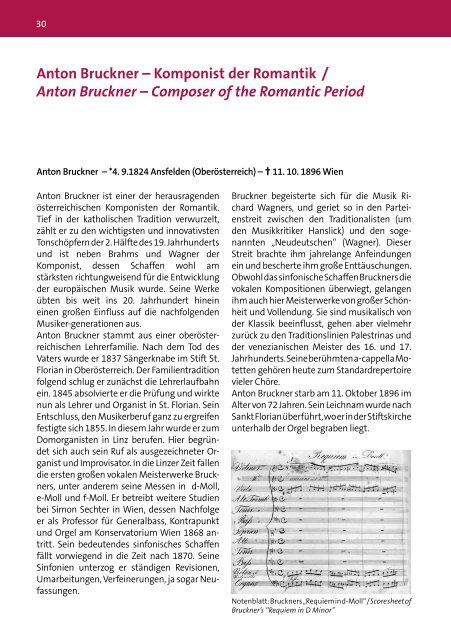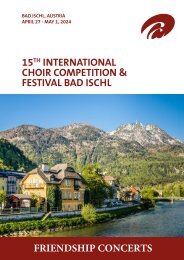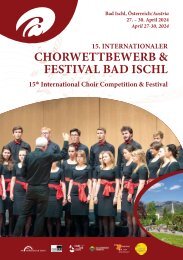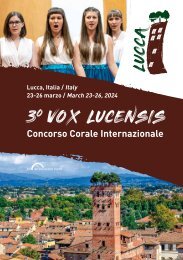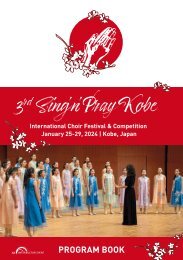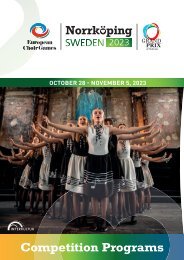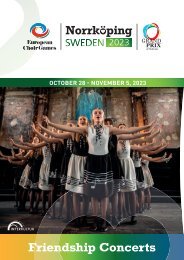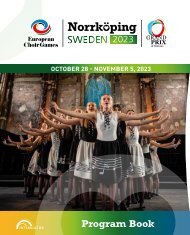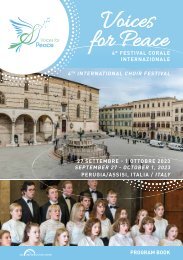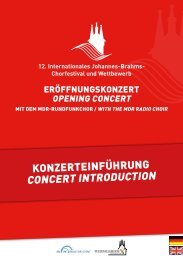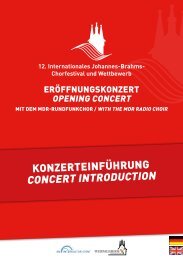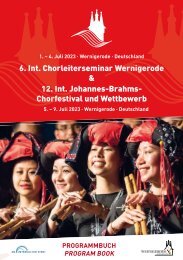Program Book - Linz 2017
6TH INTERNATIONAL ANTON BRUCKNER CHOIR COMPETITION AND FESTIVAL June 14 - 18, 2017 Linz, Austria Singing in the historic city The Upper Austrian city of Linz already proved to be a perfect host by presenting the 1st INTERKULTUR Choir Olympics in 2000. Since 2007 the city invites every two years choirs from all over the world in order to sing at the International Anton Bruckner Choir Competition and Festival. Anton Bruckner, one of the major composers of the late Romanticism, spent many years as an organist and composer at the monastery St. Florian nearby Linz and in Linz itself as a cathedral organist. Especially his motets and masses are exemplary for the Catholic Church music of the 2nd half of the 19th century and belong to the standard repertoire of many international choirs. Venues such as the Brucknerhaus, the first choice for cultural events and concerts in Linz, the new cathedral of Linz as well as the monastery St. Florian give the event a dignified setting. The festival of choral music offers choirs from all parts of the world the possibility to participate in the competitions as well as in friendship and gala concerts. A further highlight will be the competition for the Anton Bruckner Choir Prize.
6TH INTERNATIONAL ANTON BRUCKNER CHOIR COMPETITION AND FESTIVAL
June 14 - 18, 2017 Linz, Austria
Singing in the historic city
The Upper Austrian city of Linz already proved to be a perfect host by presenting the 1st INTERKULTUR Choir Olympics in 2000. Since 2007 the city invites every two years choirs from all over the world in order to sing at the International Anton Bruckner Choir Competition and Festival.
Anton Bruckner, one of the major composers of the late Romanticism, spent many years as an organist and composer at the monastery St. Florian nearby Linz and in Linz itself as a cathedral organist. Especially his motets and masses are exemplary for the Catholic Church music of the 2nd half of the 19th century and belong to the standard repertoire of many international choirs.
Venues such as the Brucknerhaus, the first choice for cultural events and concerts in Linz, the new cathedral of Linz as well as the monastery St. Florian give the event a dignified setting.
The festival of choral music offers choirs from all parts of the world the possibility to participate in the competitions as well as in friendship and gala concerts. A further highlight will be the competition for the Anton Bruckner Choir Prize.
Create successful ePaper yourself
Turn your PDF publications into a flip-book with our unique Google optimized e-Paper software.
30<br />
Anton Bruckner – Komponist der Romantik /<br />
Anton Bruckner – Composer of the Romantic Period<br />
Anton Bruckner – *4. 9.1824 Ansfelden (Oberösterreich) – † 11. 10. 1896 Wien<br />
Anton Bruckner ist einer der herausragenden<br />
österreichischen Komponisten der Romantik.<br />
Tief in der katholischen Tradition verwurzelt,<br />
zählt er zu den wichtigsten und innovativsten<br />
Tonschöpfern der 2. Hälfte des 19. Jahrhunderts<br />
und ist neben Brahms und Wagner der<br />
Komponist, dessen Schaffen wohl am<br />
stärksten richtungweisend für die Entwicklung<br />
der europäischen Musik wurde. Seine Werke<br />
übten bis weit ins 20. Jahrhundert hinein<br />
einen großen Einfluss auf die nachfolgenden<br />
Musiker-generationen aus.<br />
Anton Bruckner stammt aus einer oberösterreichischen<br />
Lehrerfamilie. Nach dem Tod des<br />
Vaters wurde er 1837 Sängerknabe im Stift St.<br />
Florian in Oberösterreich. Der Familientradition<br />
folgend schlug er zunächst die Lehrerlaufbahn<br />
ein. 1845 absolvierte er die Prüfung und wirkte<br />
nun als Lehrer und Organist in St. Florian. Sein<br />
Entschluss, den Musikerberuf ganz zu ergreifen<br />
festigte sich 1855. In diesem Jahr wurde er zum<br />
Domorganisten in <strong>Linz</strong> berufen. Hier begründet<br />
sich auch sein Ruf als ausgezeichneter Organist<br />
und Improvisator. In die <strong>Linz</strong>er Zeit fallen<br />
die ersten großen vokalen Meisterwerke Bruckners,<br />
unter anderem seine Messen in d-Moll,<br />
e-Moll und f-Moll. Er betreibt weitere Studien<br />
bei Simon Sechter in Wien, dessen Nachfolge<br />
er als Professor für Generalbass, Kontrapunkt<br />
und Orgel am Konservatorium Wien 1868 antritt.<br />
Sein bedeutendes sinfonisches Schaffen<br />
fällt vorwiegend in die Zeit nach 1870. Seine<br />
Sinfonien unterzog er ständigen Revisionen,<br />
Umarbeitungen, Verfeinerungen, ja sogar Neufassungen.<br />
Bruckner begeisterte sich für die Musik Richard<br />
Wagners, und geriet so in den Parteienstreit<br />
zwischen den Traditionalisten (um<br />
den Musikkritiker Hanslick) und den sogenannten<br />
„Neudeutschen“ (Wagner). Dieser<br />
Streit brachte ihm jahrelange Anfeindungen<br />
ein und bescherte ihm große Enttäuschungen.<br />
Obwohl das sinfonische Schaffen Bruckners die<br />
vokalen Kompositionen überwiegt, gelangen<br />
ihm auch hier Meisterwerke von großer Schönheit<br />
und Vollendung. Sie sind musikalisch von<br />
der Klassik beeinflusst, gehen aber vielmehr<br />
zurück zu den Traditionslinien Palestrinas und<br />
der venezianischen Meister des 16. und 17.<br />
Jahrhunderts. Seine berühmten a-cappella Motetten<br />
gehören heute zum Standardrepertoire<br />
vieler Chöre.<br />
Anton Bruckner starb am 11. Oktober 1896 im<br />
Alter von 72 Jahren. Sein Leichnam wurde nach<br />
Sankt Florian überführt, wo er in der Stiftskirche<br />
unterhalb der Orgel begraben liegt.<br />
Notenblatt: Bruckners „Requiem in d-Moll“ / Score sheet of<br />
Bruckner’s “Requiem in D Minor”


